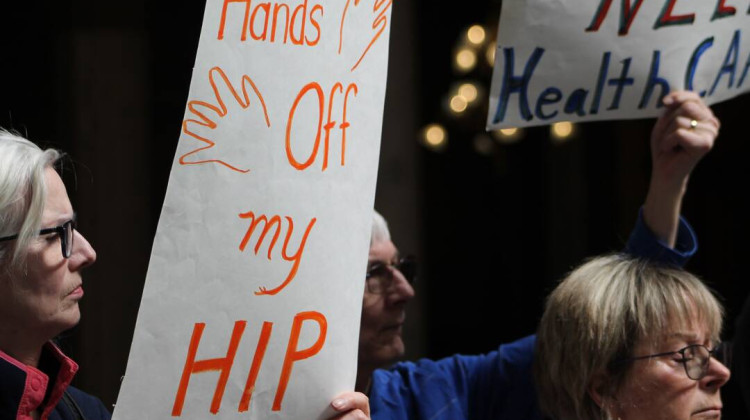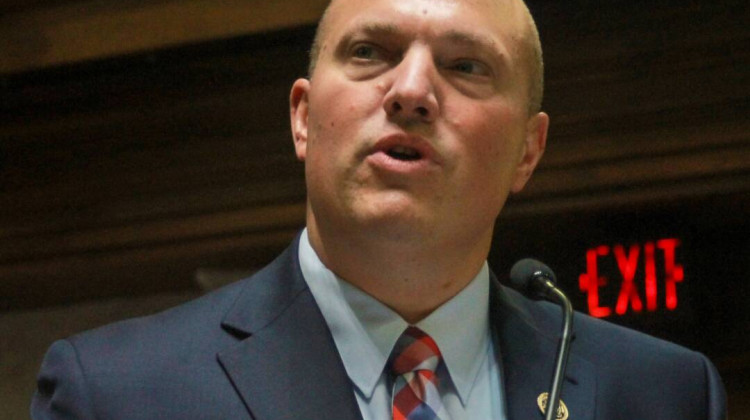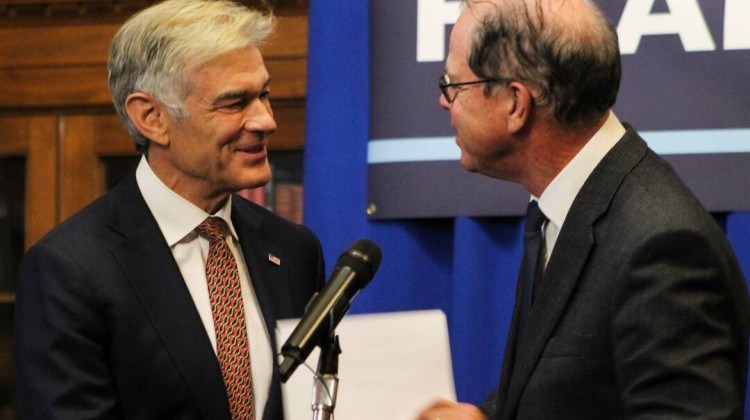
The Melody Drive-In Theatre in Knox, Indiana, offers church services in people's cars.
Justin Hicks/IPB NewsThe Indiana State Department of Health reported 12 additional deaths Monday, bringing the state’s total to 139. The state announced nearly 5,000 total confirmed cases, with more than 26,000 Hoosiers tested.
Holcomb Tweaks, Extends ‘Stay-At-Home’ Order
Hoosiers must stay at home as much as possible for another two weeks, through April 20 after Gov. Eric Holcomb officially extended his order Monday.
Holcomb made some changes regarding how businesses must follow the latest “Stay-At-Home” directive.
READ MORE: Can I Go For A Walk? Here's What The Expanded 'Stay-At-Home' Order Really Does
LEE MAS: ¿Puedo Salir A Caminar? Esto Es Lo Que Significa Una Orden De Permanecer En Casa
Essential retail businesses – grocery stores, supermarkets, gas stations, hardware stores, pet stores – can stay open. But they must limit their customers to help observe social distancing guidelines. They must also adjust hours to help accommodate older customers.
Things are also changing for non-essential businesses, says Joe Heerens, Holcomb’s general counsel.
“So, think about florists, bookstores. Think about fabric stores, craft stores, beauty supply stores,” Heerens says. “These things are not necessities of life.”
Heerens says the new executive order bans in-person customers at those businesses.
State Workforce Department Still Has No Timeline For Self-Employed Benefits
The Department of Workforce Development still has no deadline for when unemployment benefits, authorized by federal law, will reach self-employed Hoosiers – despite receiving guidance from the Department of Labor over the weekend.
DWD’s Commissioner Fred Payne says staff are working to implement the Pandemic Unemployment Assistance program as soon as possible, but he still has no definite timeline. The changes will make self-employed workers, independent contractors and gig workers able to access unemployment benefits – something he says the state’s program wasn’t built to do.
However, he says those already receiving regular unemployment benefits will begin to see an additional $600 provided by the CARES Act starting the week of April 20.
Could Indiana's Unemployment Benefits System Have Been Better Prepared For COVID-19?
Tens of thousands of Hoosiers lost their jobs almost overnight due to social distancing measures that help prevent COVID-19. The sheer amount and speed of layoffs are putting enormous strain on the unemployment insurance system in Indiana. It's leaving some wondering how the system works – and if it’s prepared to handle this crisis.
Christopher O’Leary, a senior economist at the W.E. Upjohn Institute for Employment Research says unemployment insurance is simply a rainy day fund that every employer pays into with taxes. In most states, when business is booming the tax is a little higher to save for times when it’s not.
O’Leary says the federal government tells states they should have enough money on hand to pay at least one year of unemployment benefits in a bad recession. That’s based on the highest unemployment benefit payouts from the worst three of the past 20 years. For Indiana, that translates to about $1.8 billion.
But a federal solvency report published about a month before COVID-19 was declared a pandemic says the state only has about half of that amount.
State Hasn't Yet Created Online Vote-By-Mail Application Process
Monday was supposed to be the voter registration deadline for Indiana’s primary election. But COVID-19 changed all that.
The governor and the state election commission officially moved Indiana’s primary back to June 2. With that shift came changes in deadlines: for instance, Hoosiers now have until Monday, May 4 to register to vote, which they can do online.
When it moved the primary, the election commission recommended the state set up an online vote-by-mail application that wouldn’t require anything to be mailed in. The Secretary of State’s office says that system is still in development, with no estimated date for completion.
Rural Hospitals Face Additional Challenges In Fight Against Coronavirus
Adams County was one of the first rural counties that reported a case of COVID-19. The county’s population is about 35,000 and they have only a single hospital.
16 counties in Indiana don’t have a single bed or hospital.
The majority of Indiana’s rural communities are served by critical access hospitals. They have to abide by all sorts of federal regulations including limitations on their size. While some of those have been loosened recently, usually the maximum number of in-patient beds they can have is 25, and most are only equipped with a couple of ICU beds.
"I think the challenges are that our resources don’t run very deep," Brenda Reetz says.
Reetz is the CEO at the Greene County General Hospital – a critical access facility that is the only hospital in the county. She says there are numerous challenges she and her staff face.
"Larger facilities, you can have more depth to your staffing pool, you have more depth to your supply chain, and in communities like this you’re maybe one or two layers deep at all. But, I also acknowledge that that’s also somewhat proportionate," Reetz says.

How To Stay Safe From COVID-19 While Grocery Shopping
The items you buy at the store aren’t unsafe, says Tamika Sims, a food safety expert with the International Food Information Council.
“The probability of live virus being on the outside of packages is very small,” she says. “Of course I'm saying small. I’m not saying zero.”
Sims says you don’t need to wipe down your groceries with cleaning products before putting them away. "Right now, FDA and [World Health Organization] and CDC are not recommending that anyone do that because you're creating an additional safety hazard by wiping down packages with chemicals."
Instead, Sims says, after shopping and putting away groceries, just wash your hands again. She says the safest thing shoppers can do is continue practicing good hygiene. Wash your hands or use hand sanitizer before going into the store. And don’t touch your face while in the store.
The CDC recently changed its recommendation on masks. It now says even healthy people should wear cloth masks in public, especially in areas where social distancing is difficult, like the grocery store.
All IN: How Indiana's Small Businesses Are Struggling, Adapting And Fighting Through The Pandemic
Small business owners across the state are dealing with dramatic changes caused by the coronavirus pandemic. What financial help is out there for these businesses, and will it be enough?
All IN gets the stories of small business owners from across the state, including a family-run vending company, a car repair business, and a manufacturing company run by two brothers who have started making face shields for health care workers. And they talk to Indiana’s director of a national small business association about what they’ve learned from a statewide survey of business owners.
Ball State, Purdue Move To Remove Courses For Summer
Purdue University announced Monday May and June graduate and undergraduate summer courses will be conducted remotely, and a decision about in-person July classes will be made by May 15.
“It is our hope that we are able to offer all courses originally planned for summer in a remote format,” Purdue Provost Jay Akridge wrote in a letter. “Academic progress for all students continues to be a priority.”
Akridge also confirmed the cancellation of conferences and events on campus for the month of May. The school will decide whether to hold June events by April 15, and July events by May 15. Purdue athletics will abide by campus, NCAA, and Big Ten policies.
Ball State University faculty are being told that all summer classes at the Muncie school will be offered only online.
According to emails from department heads, that includes all classes from the three summer sessions. Ball State President Geoffrey Mearns says this won’t be as big of a move as spring semester was.
“Over the past few years, the vast majority of our courses and credit hours have been online – somewhere around 75 percent have historically been online,” Mearns says.
Contact Lauren at lchapman@wfyi.org or follow her on Twitter at @laurenechapman_.
This is a rapidly evolving story, and we are working hard to bring you the most up-to-date information. However, we recommend checking the websites of the Centers for Disease Control and Prevention or the Indiana State Department of Health for the most recent numbers of COVID-19 cases.
 DONATE
DONATE






 Support WFYI. We can't do it without you.
Support WFYI. We can't do it without you.